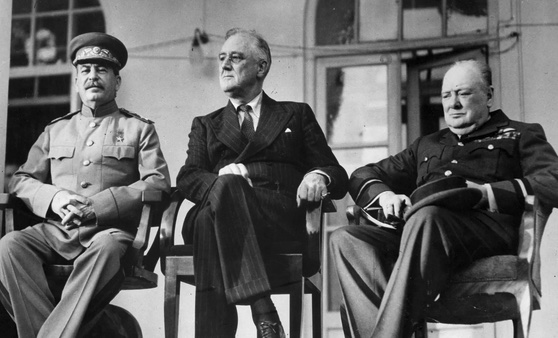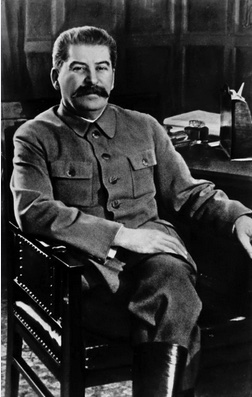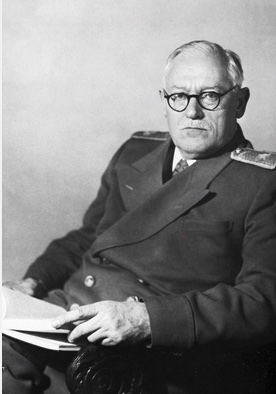
- Articles
Stalin, Mao, Communism, and Their 21st-Century Aftermath (Part II)—A Commentary by Adam R. Bogart, Ph.D
Part II of Dr. Faria’s book is a discussion of Stalin’s roles during World War II. He had already secured sole control of the country for ten years, and his first major projects to modernize the country in anticipation for war (as well as self-sustenance and self-support in various industrial capacities) had been completed by the dawn of the war in 1939. As is well known, Hitler formally broke the terms of the Molotov-Ribbentrop Pact by invading the Soviet Union on June 22, 1941, in what is known as Operation Barbarossa. Operation Barbarossa took Stalin by great surprise, as he was insistent that his top military strategists were wrong when they predicted Hitler’s plans and were consistently rebuffed by him.

By 1937, the country was under the grip of “High Stalinism.” This was a period that lasted until his death in 1953, and during which Stalin was deeply delusional, but in a position to state, “Reality is what I say it is.” His underlings were at risk of at least suffering in their careers if they told him news he didn’t want to believe, and the consequences could be much worse than that. It’s true that in 1932 or 1933 there was still room for some open discussion about matters important to the country’s security or population (such as collectivization). The Central Committee, Politburo, and Party Congresses had a bit of leeway to propose new or different ideas. It appears that the positive effect (for Stalin!) of the 1936-37 show trials was a complete solidification of his personal control over any situation he wanted it for. Plus, when collectivization was fully under way (with all its attendant disasters and deaths of millions either directly or indirectly related to it), slave labor was the main way in which great architectural projects were completed, and punishment for the sake of terror had been refined to surpass even Lenin’s and Dzerzhinsky’s methods in arbitrariness and body count, Stalin’s hold on the country was complete. Even then, he never ceased introducing increasingly cruel methods that corresponded with his distorted perception of reality. Dr. Faria gives us an excellent review of the circumstances leading up to the invasion of the USSR, as well as commentary on the well-known military ineptness of not just Stalin, but to some extent, Marshal Voroshilov. Probably Hitler could have been beaten back much faster (and with much less attendant loss of life) if Stalin hadn’t imposed his distorted reality on the whole country. In that respect, Voroshilov and other Red Army commanders cannot be faulted. They were never given permission to prepare for war, because Stalin didn’t want to hear that Hitler was going to start one. Dmitri Volkogonov and many others assume Stalin had a personal reason for doubting Hitler would attack the USSR. This was because Stalin saw Hitler as a kindred spirit and a friend. This may well be the case, but Hitler saw Stalin with the same kind of affection. He invaded the Soviet Union anyway. It wasn’t personal, and it is suggested by some that if Hitler had won the war, he would have let Stalin continue to rule some autonomous region in the USSR; a region that was not going to be considered lebensraum by the Nazis. Could it be that Stalin was preparing for the invasion, and his shock when it happened was in large measure due to his inaccurate prediction of how early after the MR pact was signed? This does not modify the theory that both dictators had great affection for each other, but it does present Stalin as being more practical concerning Hitler than many have previously believed. Dr. Faria writes that Hitler despised Bolsheviks. This has always been the conventional wisdom but given how much he borrowed from Lenin to successfully create a one-man rule totalitarian state, I am not sure he believed anything he said about them.
There is also the suggestion that in addition to the other reasons covered here, that Stalin got rid of Tukhachevsky because he knew of Stalin’s secret past as an agent of the Okhrana in late Tsarist times. I am sure Stalin was occasionally an informant to the Tsarist secret police on his own comrades, but I tend to see this as his sadistic method of dealing with people he didn’t like, rather than officially working undercover as a double agent. Stalin was an early and dedicated Bolshevik; how would officially being an Okhrana informant advance his goals to see the Tsar overthrown by Marxism? To understand this, one must realize that the Stalin of 1907 was not the Stalin of 1927 or 1937. I believe there was a time when Stalin sincerely wished to dedicate his career to alleviating the problems facing minority non-Russians and the poor under the Tsarist system. It doesn’t matter than Communist rule was far worse than Tsarist rule because everybody knows by this time that Tsarism was preferable, and that is not the point. What matters is that Stalin was a non-Russian minority himself and had experienced living in the Tsarist Russian Empire. So, unlike most of the old Bolsheviks (including Lenin) at least he knew from personal experience what deprivation and governmental indifference was. Did he really see himself as eventually becoming a brutal totalitarian dictator in 1907? No, just like Hitler had been close to his mother’s Jewish surgeon beginning with his treatment of Hitler’s mother in 1907. For at least 10 years thereafter Hitler interacted with Jews freely in both friendship and business. In 1907, Hitler merely saw himself as a future artist. In 1917, he was admiring his Jewish commanding officer during his time in the army. It seems like after the war ended that Hitler’s views radically changed. As an aside, the conventional wisdom that Hitler turned against the Jews because they rejected him from art school is absolute nonsense. His paintings weren’t bad at all (which they noted), just rather unanimated and mechanical. One could expect nothing more from Hitler’s mind! They did recommend he study architecture instead, and while he didn’t, he was very fond of it for all of his adult life.

In this case, it was originally believed that forged documents implicating Tukhachevsky and eight other military officials in spying for Nazi Germany were forged by German counterintelligence, but now we know these documents were forged by the NKVD under Stalin’s orders. That didn’t stop high ranking Nazis (such as Reinhard Heydrich and Walter Schellenberg) from believing they had successfully induced Stalin to have eight good military men tried and shot. They didn’t, and the NKVD forgeries were merely meant to lend credence to the charges Soviet Supreme Court prosecutor Andrei Vyshinsky’s harangued the defendants over at their 1937 show trial. Stalin had to do this, because as has been previously stated, he admitted to knowing Tukhachevsky was innocent. It’s interesting that the Nazis realized how valuable the military men were that Stalin shot, while he didn’t.
Stalin, Mao, Communism, and their 21st-Century Aftermath in Russia and China (January 2024) by Dr. Miguel A. Faria was published by Cambridge Scholars Publishing in Newcastle upon Tyne, United Kingdom. You can order the book from Cambridge Scholars Publishing. It is a beautiful hardback book, fully illustrated with over a hundred illustrations, including an insert with glossy color prints. For a 25% discount, enter code PROMO25 to redeem during your online purchase. Or email Cambridge Scholars Publishing at orders@cambridgescholars.com.
Read Part III of this Commentary
Reviewed by Adam Bogart, PhD
Adam Bogart, PhD, is a Behavioral Neuroscientist at the Sanders Brown Center for Aging University of Kentucky, Lexington, KY. Behavioral Neuroscience Kent State University Kent, OH. Post-doctoral fellow at the Albert Einstein College of Medicine, Gruss Magnetic Resonance Research Center Bronx, NY. MS Immunology conjointly Adelphi University/Mount Sinai Medical Center New York City, NY.
This article may be cited as: Bogart, A.R. Stalin, Mao, Communism, and their 21st-Century Aftermath (Part II)—A Commentary by Adam R. Bogart, PhD. HaciendaPublishing.com, June 10, 2024. Available from: https://haciendapublishing.com/stalin-mao-communism-and-their-21st-century-aftermath-part-iia-commentary-by-adam-r-bogart-ph-d/.
Copyright ©2024 HaciendaPublishing.com